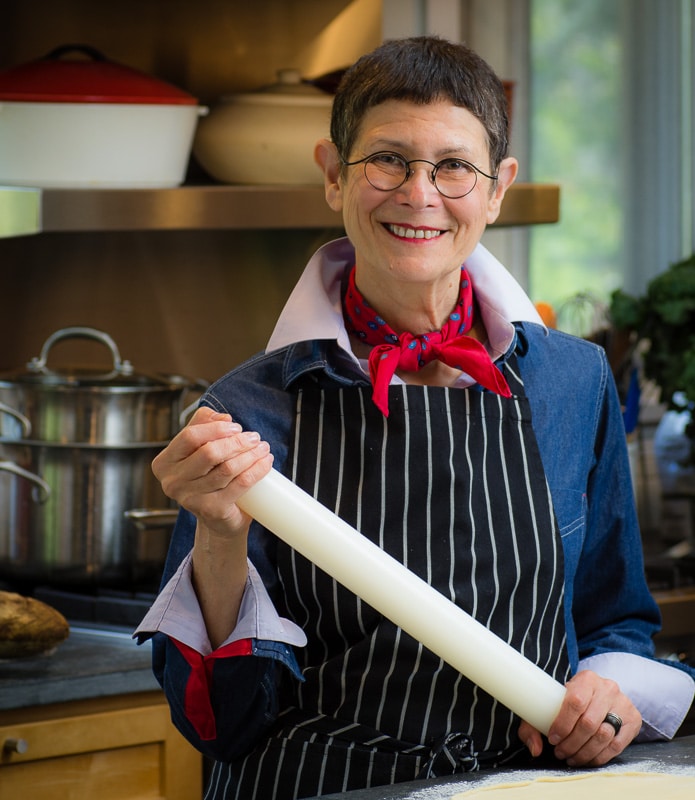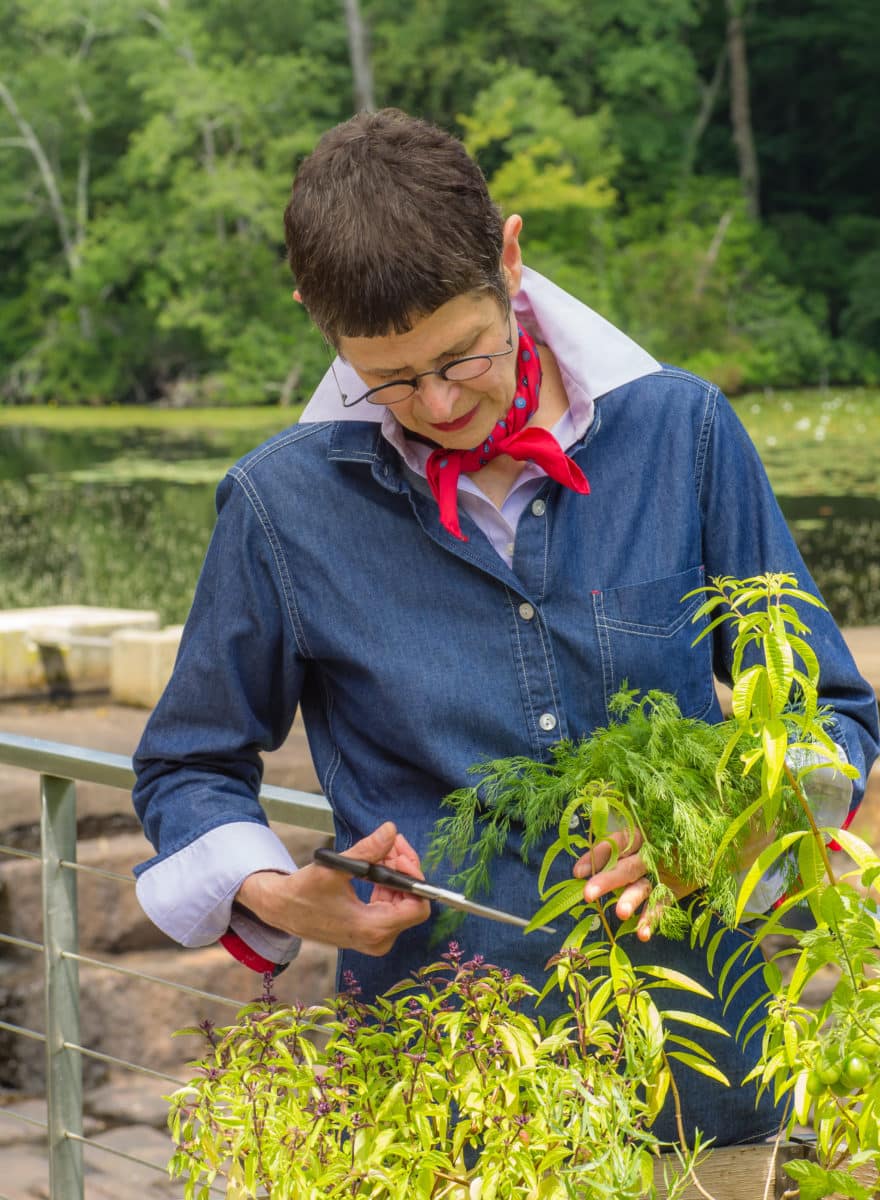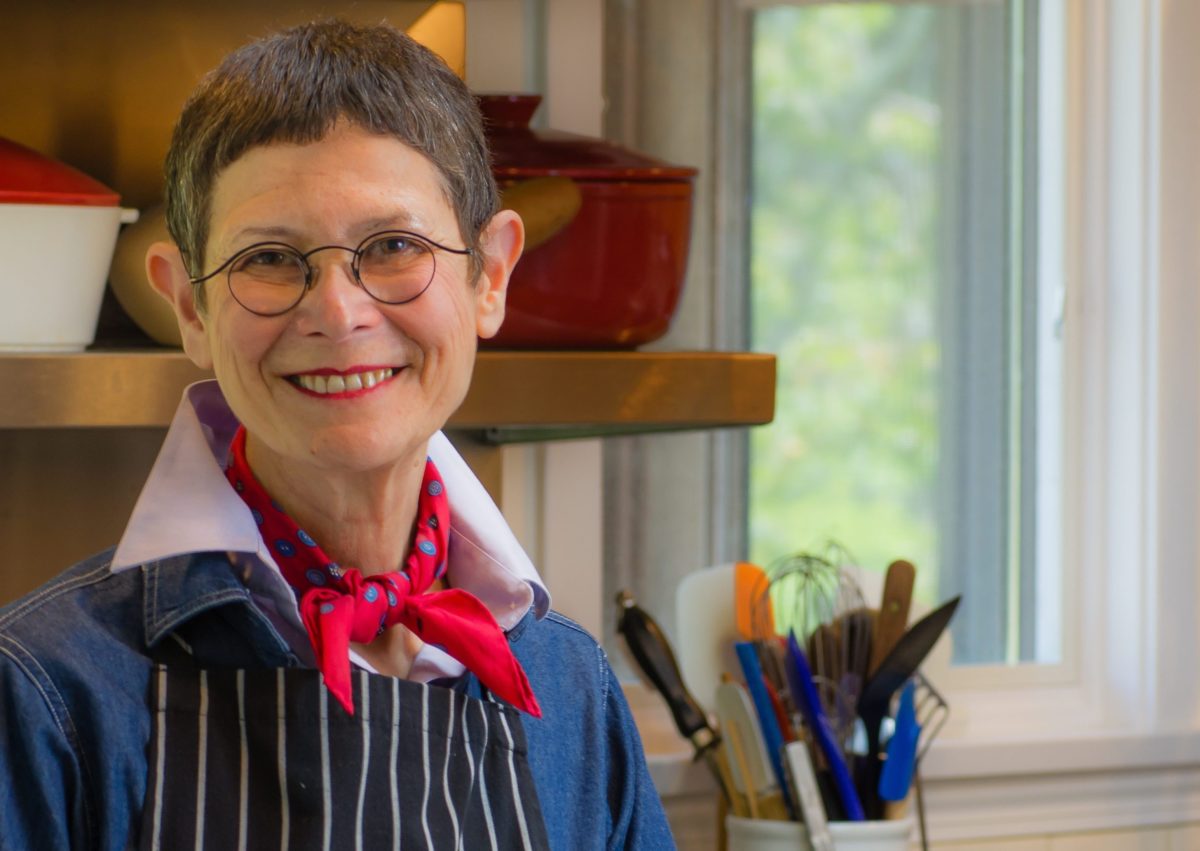Dorie Greenspan is in her airy country kitchen, eyeing an improvised version of a Brown Butter-Peach Torte she’d baked earlier in the day. Having run out of time to make and roll out a top piecrust, she’d modified the recipe with a streusel topping. I think the tart looks delicious, but Dorie is concerned that the filling may have become too runny.
She needn’t have worried. Like her mentor Julia Child (with whom she collaborated on the 1996 book Cooking with Julia), Dorie Greenspan is a curious, impulsive cook who excels at developing new recipes. “Once you get the basic building blocks of pastry out on the table, then you get to play,” she says impishly. “The possibilities are endless.”
Her inventiveness wasn’t always an asset. At the tender age of 13, while experimenting with “frying” frozen French fries, she started a fire in her parents’ newly renovated Brooklyn kitchen. That experience kept Dorie far from the kitchen until she was a young college-student bride and discovered that she loved to cook. She “consciously and conscientiously” taught herself to bake in the tiny closet-turned-kitchen that became her favorite room in the Brooklyn Heights apartment she shared with her husband, Michael, and eventually changed her career path from gerontology to cooking — only to be fired from an entry-level job for insubordination because she changed a recipe. Now, having persevered in what was a male bastion — “a time when there were no women in restaurant kitchens, no Food Network, and about three food magazines, never with a woman on the cover” — Dorie Greenspan is one of the top names in the food world, with ten acclaimed cookbooks, a popular blog, a robust social media following, and a well-earned moniker of “culinary guru” from the New York Times.
Visiting Dorie at her bucolic Connecticut home to learn the backstory of her career and talk about her new book, Baking Chez Moi, I am welcomed like a friend of the family; breaking bread before working, mais oui! Among the items she serves at our delectable farm-to-table lunch are kale salad with shaved apple and scallion; cauliflower salad “with everything in it”; chunky watermelon-tomato gazpacho; ricotta with garden herbs; and a crusty baguette baked by Michael in a steam-injection oven the couple keeps in the basement. As Dorie pours us a spot of bubbly Lambrusco, a fine choice on this perfect July day, she explains that in France, it is still frowned-upon for women to pour wine.

Nonetheless, the art of French cooking has been, and continues to be, a big influence on her oeuvre, with a long-time home in Paris allowing her to become immersed in the French way of food. And, of course, there’s her collaboration with Julia Child. “It was an extraordinary experience,” she says. “Julia was the same in person as she was on camera; smart, curious, generous, and caring. She was both an inspiration and my best cheerleader.” The first time Dorie visited Julia’s house, the master was in her kitchen experimenting with boiling eggs. “She never stopped wanting to learn.”
The collaboration with Julia was one of the first times Dorie worked with other people’s recipes. “I think editing and testing others’ work made me a better editor of my own, and a better recipe writer,” she says. “And I really love collaborating.” She has also partnered with celebrated chef Daniel Boulud and famous French pastry chef Pierre Herme.

The secret to writing a successful recipe? “Don’t leave anything to the imagination, but don’t sound like a drill sergeant with one declarative sentence after another.” Dorie’s writing has an engaging, conversational tone because she envisions an imaginary person by her side, following the recipe along with her. “It’s all about step-by-step information and also anticipating what might make people anxious, so I can encourage them to persevere. ‘It may look like all your hard work has collapsed but if you add five more pats of butter’. . .”
"We bake to share."
And there’s always a context to Dorie’s recipes, which makes them fun to read. Her ideas come from her travels to the tables of friends and from chance encounters, as well as from abstract concepts, such as what food colors go together. “I obsessively think about food,” she says. “The ideas just pop. Thousands of recipes later, I still get excited.”
For Dorie, writing a cookbook isn’t just about sharing recipes — it’s also about telling stories. Her latest book, Baking Chez Moi: Recipes from My Paris Home to Your Home Anywhere (October 2014), is the third in what she describes as a trilogy of “culinary memoirs,” starting with Baking From My Home to Yours (2006) and the New York Times bestseller Around My French Table (2007). Her expertise, enthusiasm, and unpretentious style have not only earned her top billing as a food celebrity, but also gained her a substantial social media fan base. Her following of hundreds of members in two online cooking clubs, French Fridays with Dorie and Tuesdays with Dorie, have cooked their way through her most recent two books. “The growth of these online communities is remarkable,” she says. “Before the Internet, you would send a book out into the world unsure that anyone other than your mother would buy it.”
Cooking club members will soon be baking their way through Baking Chez Moi — to me, a daunting prospect. I confess to Dorie that I am intimidated by the precise requirements of baking, not to mention French baking. She smiles, and kindly notes that I am not alone — many participants in her cooking clubs started with no baking experience. After learning the basics, they gained confidence. “It’s reassuring that when you follow a good baking recipe, in many ways it is easier than cooking because there is less guesswork,” she says. “Once you gain the teensiest proficiency in baking, then you can play. And I hear over and over again that learning to bake gives people confidence not only in the kitchen, but confidence in other parts of their lives.”

What else distinguishes baking from cooking? “The obvious is that baking is a treat. We cook to feed ourselves, but we bake to share, to give someone something sweet,” she observes. “The process of baking is also different — it’s very tactile, and it’s kind of a mystery. There’s an element of magic because you are transforming ingredients in such a profound way.”
The recipes in Baking Chez Moi, gleaned from French home kitchens, are much more accessible than I had imagined. In France, Dorie explains, friends “bake very simply for the people they love. For a fancy occasion, they go to the pastry chef. It’s a parallel to what we typically think of as French baking, what a friend of mine describes as ‘comfort baking.’” Readers of her new book will learn how to make simple yet delicious desserts, from “Odile’s Orange Cake” to “Laurent’s Slow-Roasted Spiced Pineapple.” They will experience Dorie’s Paris life, get to know her Paris friends, and hear the backstories of the recipes. “This book is personal,” she says. “You’re going to meet some wonderful people.”
Dorie’s Batterie de Cuisine
Dorie Greenspan commutes between Connecticut, New York, and Paris. But, “I never say I have three homes,” she notes with a twinkle, “I say I have three kitchens.” What are the indispensible tools that she keeps stocked in each batterie de cuisine? A kitchen scale; American measuring cups/spoons in Paris and metric measures in her U.S. kitchens; a stand mixer; a food processor; good pots and pans from skillets to stockpots; several mixing bowls; silicone spatulas; parchment paper; and aluminum foil and wax paper, which she brings to Paris from the U.S. Her cupboard supplies always include good quality vanilla extract, cocoa powder, and basic spices from ginger to cinnamon.
Why Buy a Book?
In today’s connected world, people can Google online recipes in seconds. So why buy cookbooks? “Going online is fabulous when you have some idea of what you want to cook,” says Dorie Greenspan. “But with a book, you have someone’s vision, not just the recipe. You develop a relationship with the author, and when things go well, you trust that author. I get all sorts of information online, but that doesn’t replace the adventure of a new cookbook.” ![]()
